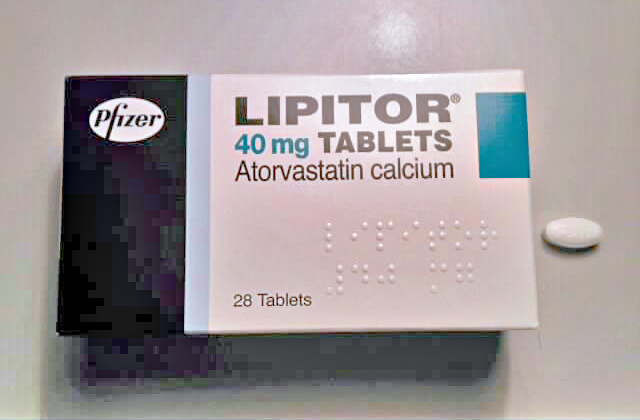
I learned this today. Statins work by blocking a substance that our bodies need to make cholesterol.
What is cholesterol? Cholesterol is a waxy, whitish-yellow fatty substance that our bodies use to build cells, make vitamin D, and make hormones, and fat dissolving acids. It is an essential part of our bodies. A 68 kg, 150 lb, human male synthesizes about 1 gram of cholesterol per day and his body contains about 35 g. Your liver produces the cholesterol, and it makes about 80% of all the cholesterol that your body needs. The rest comes from the food you eat. Once the cholesterol has been produced by the liver, it is sent to various places in the body through the blood. It wouldn’t be possible to just let the cholesterol flow into the blood because it is a fat, and it would just get all gloopy. It has to be kept together so it can flow around in the blood and the liver does this by wrapping it in proteins. These are called lipoproteins.
The cholesterol floats around the blood stream in four basic forms. There are very-low-density lipoproteins (VLDL), intermediate-density lipoproteins (IDL), low-density lipoproteins (LDL), and high-density lipoproteins (HDL). VLDL has a low percentage of cholesterol to proteins and other fats. However, as it moves round, it loses the other fats and its ratio of cholesterol to protein increases until it becomes LDL. Some of the VLDL are returned to the liver and broken down to become bile acids. These go into the intestines and help with breaking down the fats in food. LDL is low density because it has more cholesterol than protein. Its job is to carry fat around the body to the places where it is needed. LDL is the cholesterol responsible for most of our problems and is called the “bad cholesterol”. HDL is high density because it has more protein than cholesterol. HDL carries cholesterol away from the cells to the liver where it is converted into bile acids. Higher levels of HDL can reduce many of the risks that LDL causes, so it is known as the “good cholesterol”.
What is the problem with cholesterol? If you let your body produce cholesterol and supplement it with a little more, there is no problem. The problem comes when too much cholesterol is consumed, and that is an increasingly easy thing to do. I said earlier that the average adult male needs about 1 gram of cholesterol a day. The body will make about 80% of that, which means we need to get another 200 milligrams of cholesterol from somewhere. A large egg yolk has about 186 milligrams of cholesterol, so, one egg a day and that’s enough cholesterol. The problem is most food contains cholesterol.
So, what is the problem with too much cholesterol? Too much HDL is not a bad thing. Too much LDL is. LDL carries large quantities of cholesterol to the cells and other places where it is needed. If your body has more LDL than it needs, it can form a thick, hard plaque on the inside of arteries, narrowing them and making them less flexible. If the artery is narrow and less flexible, all it takes is one small blood clot to block it and cause a heart attack or a stroke.
How do statins help with this? Statins basically work by stopping the liver from producing cholesterol and getting it to remove cholesterol that is in the blood. They do this by blocking the enzyme that is responsible for making cholesterol. This still leaves the cholesterol that you eat, but statins coupled with a low cholesterol diet can make a world of difference. A secondary advantage of cutting down on the amount of cholesterol that your liver produces is that the liver starts to reabsorb the cholesterol that has built up in your body and arteries. Your body needs a certain amount of cholesterol and if it senses that there isn’t enough cholesterol circulating in the blood, it will use what it can find.
Statins are not perfect drugs, and they do have some side effects, but they can be a life saver because high cholesterol can very easily be fatal.
Many doctors, physicians, and cardiologists didn’t believe that there was a connection between high cholesterol and heart disease. In 1971, Akira Endo, a Japanese biochemist started to research the possibility of blocking the liver’s production of cholesterol. A British team came up with a drug in 1976, but it proved fatal in animal tests. By 1987, the first statins were marketed. In the 1990s, there were massive health campaigns aimed at teaching people about cholesterol and the number of people using statins rose. A study in 1994 showed that out of 4,444 patients with high cholesterol and heart disease, 35% had lowered their cholesterol and their chances of dying from a heart attack had dropped by 42%.
So, statins work by blocking the liver from producing LDL cholesterol. And this is what I learned today. And I also learned that I really need to get my cholesterol down.
Photo By Panthro at English Wikipedia, CC BY-SA 3.0, https://commons.wikimedia.org/w/index.php?curid=4938042
Sources:
https://en.wikipedia.org/wiki/Cholesterol
https://en.wikipedia.org/wiki/High-density_lipoprotein
https://en.wikipedia.org/wiki/Low-density_lipoprotein
https://en.wikipedia.org/wiki/Very_low-density_lipoprotein
https://en.wikipedia.org/wiki/Bile_acid
https://www.heart.org/en/health-topics/cholesterol/about-cholesterol
https://www.mayoclinic.org/diseases-conditions/high-blood-cholesterol/in-depth/statins/art-20045772
https://www.nhs.uk/conditions/statins/
https://en.wikipedia.org/wiki/Statin#Available_forms
https://www.health.harvard.edu/heart-health/how-its-made-cholesterol-production-in-your-body
https://www.heartuk.org.uk/cholesterol/what-is-cholesterol
https://www.mayoclinic.org/diseases-conditions/high-blood-cholesterol/symptoms-causes/syc-20350800
https://en.wikipedia.org/wiki/List_of_cholesterol_in_foods
https://www.healthline.com/health/high-cholesterol/how-do-statins-work
